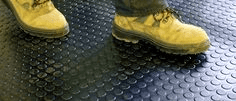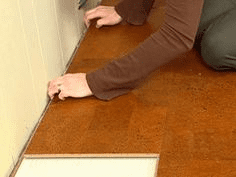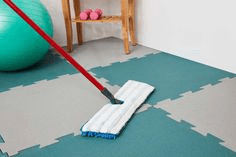Rubber flooring is a good option if you want to experiment with your floors and try something new. Rubber flooring is typically used in locations like gyms, where its resilient surface can withstand shocks from fallen weights. However, it is now popular for other rooms, including kitchens, baths, and mudrooms. Here’s all you need to know about the advantages and disadvantages of opting for rubber flooring.
See also: Parquet flooring: Types, advantages and disadvantages
Rubber flooring: Advantages

Source: Pinterest
- Highly durable: Rubber flooring is incredibly robust. This explains why gyms and other sporting facilities use it so frequently. A rubber floor that is properly maintained can last up to 20 years or longer. Rubber performs well in areas with high usage and is less prone than other floor coverings to scratch, dent, tear, or wear.
- Low maintenance: Rubber flooring requires very little upkeep. It requires no additional effort from you and is quite simple to maintain. Dirt can be swept away, and spills can simply be cleaned up.
- Hypoallergenic: Rubber is hypoallergenic and antibacterial. Rubber floors are inherently resistant to fungus, mould, and other allergies and are simple to keep clean. It is perfect for persons with allergies or asthma because of its innate resistance to germs.
- Rich in variety: Rubber comes in a large variety of styles, colours, textures, and other characteristics. Versions in tile and sheet form, flat or patterned appearances, and a wide range of colours are also available. Modern rubber flooring, which historically exclusively came in grey or black, may appear chic and fashionable with a variety of home design types.
- Ideal for areas prone to get wet: Rubber flooring is ideal for spaces like kitchens and bathrooms since it is very water and stain resistant. Rubber is not damaged by spills, and combined with its antibacterial properties; it is not likely to grow mould.
- Fire-resistant: Rubber is a safe material for flooring because it is non-toxic when burned and very resistant to fire and burns.
- Soundproofing effect: Rubber has sound-dampening properties that help in silencing loud noises and the sound of footsteps. This also refers to rubber’s outstanding insulation qualities.
Rubber flooring: Disadvantages

Source: Pinterest
- Expensive: For many people, rubber flooring’s major disadvantage is that it may be extremely expensive. Because of this, it may be unaffordable for some people or if you are flooring a sizable space.
- Not to everyone’s taste: Rubber flooring may not appeal to everyone. While it might not clash with a more conservative design philosophy, it can look trendy and elegant in more modern homes.
- Distinct odour: Some folks may not like the distinct smell that rubber has.
- Stain-prone: While rubber is often stain-resistant, some substances, such as detergents, can make it stained.
Rubber flooring: Cost
The cost of premium rubber flooring can be high. The price of tiles that are appropriate for exercise rooms may be less than Rs 163 per square foot, while the price of tiles that are ideal for living spaces can reach Rs 975 to Rs 1,219 per square foot, which is equivalent to the price of some natural stone and other high-end flooring materials. For quality rubber flooring, you should budget Rs 244 to Rs 406 per square foot on average.
Rubber flooring: Maintenance

Source: Pinterest
Rubber flooring requires very little maintenance. Typically, a damp mop is all that’s needed to clean rubber flooring (never wet). If you use a cleaning product, ensure it is safe for your flooring by checking with the manufacturer first. Natural rubber is typically less stain-resistant than synthetic rubber flooring. Some varieties can be polished with a water-soluble wax to increase their resistance to stains and damage. Still, the wax must be removed and reapplied regularly, adding to the material’s maintenance requirements.
Despite being resistant to most stains, some substances can stain rubber flooring’s surface. Abrasive cleaning agents and strong detergents can particularly damage rubber floors. Rubber flooring has the disadvantage of being soiled by grease and oil, which should make any seasoned home cook think twice before installing it in their kitchens.
Durable rubber flooring for high-traffic areas
Rubber floors are known for their durability and can handle intense workouts and. Thus, they are best suited for high-traffic commercial gyms. The durability comes from its density.
Eco-friendly rubber flooring options
Rubber flooring can be designed using recycled materials, which increases the scope of sustainability in the overall design. This helps in the reduction of wastage and can be a cost-effective option.
Rubber flooring for gym and fitness spaces
Rubber flooring have properties that help absorb stress and high impact. Thus, in modern gymnasiums, one requires a flooring that can withstand the impact of heavy workout. It can also minimise the stress and impact on knees, protecting against injury. Further, the material is also slip-resistant and water-resistant, which make it an ideal choice for fitness spaces.
Slip-resistant rubber flooring for safety
Rubber flooring displays slip-resistant qualities even when exposed to water. Thus, it provides safety against fall. It is an ideal option for outdoor workout areas, gardens or patio. If you want to protect your flooring and prevent water from reaching the subfloor, install a rubber floor finish and sealer.
FAQs
Can rubber flooring be installed over concrete?
Yes, it can. Rubber flooring is quite popular among those who have home gyms because it is simple to install. They do not even need glue or specialised instruments. To swiftly install them directly over the concrete slab, roll them out or lock them together.
Does rubber flooring require a space for expansion?
The rubber flooring is quite sturdy and will not expand or contract under normal interior conditions, but because it is rubber, it can stretch. You can stretch and avoid wall bunching by leaving the space open.
Is rubber flooring good for bedrooms?
Rubber flooring is known to be durable and easy to maintain. Thus, it can be an ideal choice for areas such as children’s bedroom or playroom.
Is rubber flooring expensive?
Rubber flooring can be slightly affordable than other flooring options like wood.
Can you put rubber flooring over tile?
Rubber flooring can be installed over an existing tile floor, making the space ideal for heavy use. Thus, these are suited for areas like gymnasiums and even homes.
| Got any questions or point of view on our article? We would love to hear from you. Write to our Editor-in-Chief Jhumur Ghosh at jhumur.ghosh1@housing.com |






